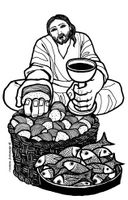
ContextJesus had multiplied bread for the hungry crowd. Sensing that they would forcibly make him King, he escapes to the mountain. His disciples meanwhile get into their boat and cross to Capernaum. Later Jesus walks on the water and catches up with them. The people notice that Jesus and his disciples have disappeared. They follow them to Capernaum and find them there. The gospel passage for this Sunday is taken from the ensuing conversation between Jesus and the people.
Manna and the Living BreadWhen Israel wandered in the desert in the days of Moses, God fed them with manna. But the manna was just a figure of the true bread from heaven that God would give to his people. This true bread from Heaven is the flesh of Jesus given for the life of the world.
The Flesh and Blood of JesusNot only will Jesus give his flesh to be eaten. He will also give his blood to be drunk. He insists that his flesh is truly food and his blood truly drink. To those who would eat his flesh and drink his blood, he promises: (a) eternal life (b) resurrection on the last day and (c) that Jesus will remain in him and he will remain in Jesus.
To bring home the truth that Jesus is giving himself as food to us he uses the following words: "The one who feeds on me will have life because of me."
The EucharistThe Eucharist is the Sacrament of the Body and Blood of Jesus. On this Feast of Corpus Christi we celebrate the giving of Jesus of his Body and Blood to us.
The Eucharist is called the Sacrament of the Real Presence. This is meant to emphasize that the Eucharist is not merely a symbolic presence of Jesus. No. In the Eucharist Jesus is really, truly present. When we receive the Eucharist, it is Jesus we receive.
Ordinarily when we receive communion we receive it under the species of bread. We must know that when we do so we do not just receive a part of Jesus (his Body). We receive Jesus himself, that is, the whole Jesus, his humanity and divinity. In the same way when we receive communion under the species of wine, we receive Jesus himself--his humanity and divinity--and not just a part of him.
The Bread That Makes Us StrongFood is necessary for strength. When a sick person refuses to take food, he will be unable to recover. And when he recovers, he needs food to regain his strength.
We are weak human beings. The expression "sapagkat ako'y tao lamang" is an admission of weakness that leads to failure.
If we are to overcome temptation and sin, we need the strength that comes from the Food that comes down from Heaven, the Eucharist. if we are to grow in faith, then we need the Food that will make that faith strong. We need to feed on Jesus in the Eucharist. No wonder Don Bosco when encouraging his boys to receive the Eucharist did so by assuring them that the Eucharist is the Bread that makes us strong.
We who are weak in the face of temptation, let us approach Jesus in holy communion so that he may make us strong. We whose faith is weak, let us approach Jesus in holy communion so that he make our faith strong. For indeed the Eucharist is the bread that makes us strong.
No comments:
Post a Comment